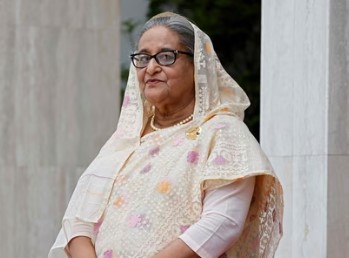
Bangladesh's interim government has formally requested India again to extradite former Prime Minister Sheikh Hasina, who was sentenced to death.
Bangladesh’s interim government has sent a fresh request to India seeking the extradition of former prime minister Sheikh Hasina, days after she was sentenced to death by the International Crimes Tribunal. Hasina, 78, has been living in India since August 2024 after being ousted in the student-led “July Uprising” that forced her government from power.
Foreign Affairs Adviser Touhid Hossain confirmed on Sunday that Dhaka had issued a new formal communication to New Delhi. According to officials quoted in the Dhaka Tribune and state-run BSS, the latest note verbale, sent through the Bangladesh High Commission in New Delhi, went out shortly after Bangladesh’s National Security Adviser Khalilur Rahman returned from a regional security meeting in the Indian capital.
Extradition letters sent by Dhaka
This letter is reported to be the third formal extradition request since Hasina fled to India. An earlier note was sent in December 2024, and another after the trial’s conclusion. Dhaka has also asked India to return former home minister Asaduzzaman Khan Kamal, who was sentenced to death in the same case and is believed to be hiding in India. Former police chief Chowdhury Abdullah Al-Mamun, who testified for the state, received a five-year jail term.
What Dhaka said after the death sentence
After Monday’s verdict, Bangladesh’s foreign ministry publicly reminded India that the extradition treaty between the two countries obligates New Delhi to send back convicted individuals. The ministry warned that giving shelter to those found guilty of crimes against humanity would be “a grave act of unfriendly conduct” and a “travesty of justice.”
India responded by saying it had “noted” the tribunal’s decision and reiterated that it remains committed to supporting peace, democracy and stability in Bangladesh. However, it has not directly commented on the extradition request, past or present.
Security experts in Dhaka have also weighed in. ANM Muniruzzaman of the Bangladesh Institute of Peace and Security Studies said India is expected, under international norms and the bilateral treaty, to return convicted individuals when formally asked. He added that Hasina’s trial, conducted in her absence, had “met international legal standards.”
How it all started
Bangladesh has been turbulent since Hasina’s removal. The UN has reported that around 1,400 people were killed during the July-August 2024 crackdown, figures that formed the basis of the charges framed against her. The uprising ultimately led to the arrival of Nobel laureate Muhammad Yunus, who took charge of the interim government following the protests.
Relations between Dhaka and New Delhi, once warm during Hasina’s tenure, have been strained since her ouster. But the recent visit of Bangladesh’s National Security Adviser to India has introduced a small thaw, with reports that he has invited his Indian counterpart Ajit Doval to visit Dhaka.

















